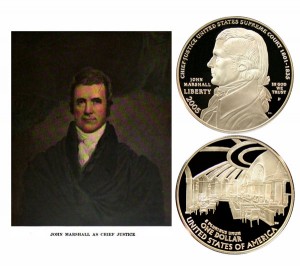Today, the Chief Justice John Marshall Commemorative Silver Dollar Coin remembers the message President John Adams sent to the Senate on January 20, 1801.
From the Century of Lawmaking at the Library of Congress:
=====
United States Jan 20th 1801.
Gentlemen of the Senate.
I nominate John Marshall, Secretary of State, to be a Chief Justice of the United States, in the place of John Jay, who has declined his appointment.
John Adams.
=====
In the Massachusetts Law Quarterly of November 1918, F. W. Grinnell, Secretary, included an introduction of the Chief Justice, and the publication also showed a portrait of Marshall by Jarvis.
=====
It should always be remembered to the credit of John Adams that during the last weeks of his administration as president, when his peculiarities of temperament and their results made some men think him almost crazy, he performed one of the greatest single acts of civil service in history by the appointment of Marshall as Chief Justice.
In the preface to the first volume of his “Life of John Marshall,” Senator Beveridge says: ” Less is known of Marshall . . . than of any of the great Americans; . . . even to the legal profession, he has become a kind of mythical being endowed with powers and wisdom not of this earth. . . . Yet, no man in our history was more intensely human than John Marshall and few had careers so full of movement and color.”
As an introduction to the address which Senator Beveridge is to deliver to us about ” The Assault on the Judiciary ” and the man who stands in American history as its foremost judicial figure, the bar will be interested to have before them a portrait of the great Chief Justice as he looked at the beginning of his judicial career, before advancing years and responsibilities had veiled somewhat the genial expression of his earlier appearance.
Accordingly, permission has been obtained to reproduce the Jarvis portrait now in the possession of Roland Gray, Esq., of the Boston Bar.
“On January 20, 1801, . . . without previous notification even to himself, John Marshall” (then forty-five years old and Secretary of State) “was nominated as Chief Justice of the United States a few weeks before the Federalists went out of power forever. His appointment was totally unexpected. It was generally thought that Judge Paterson was the logical successor to Ellsworth. Marshall, indeed, had recommended his selection. The letters of the Federalist leaders, who at this period were lynx-eyed for any office, do not so much as mention Marshall’s name in connection with the position of chief justice.” — Beveridge’s ” Marshall,” Vol. II, 553.
“Marshall’s appointment . . . was not greeted with applause from any quarter; there was even a hint of Federalist resentment because Paterson had not been chosen. . . . The Republican politicians were utterly indifferent, and the masses of both parties neither knew nor cared about Marshall’s elevation.” — Ibid., p. 555.
All of those “who thought they knew him, both friend and foe, . . . were agreed as to his extraordinary ability. No respectable person, even among his enemies, questioned his uprightness. The charm of his personality was admitted by everybody. But no one had, as yet, been impressed by the fact that commanding will and unyielding purpose were Marshall’s chief characteristics. . . .
“Who could discern in this kindly person, with ‘lax, lounging manners,’ indolent, and fond of jokes, the heart that dared all things? And all overlooked the influence of Marshall’s youth, his determinative army life, his experience during the disintegrating years after Independence was achieved and before the Constitution was adopted, the effect of the French Revolution on his naturally orderly mind, and the part he had taken and the ineffaceable impressions necessarily made upon him by the tremendous events of the first three Administrations of the National Government.” — Ibid., pp. 563-4.
In his address at the Bar Dinner in 1901, on the centennial anniversary of Marshall’s appointment, the late Hon. Richard Olney said:
“If it be true — as it is, beyond cavil — that to Washington more than to any other man is due the birth of the American nation, it is equally true beyond cavil that to Marshall more than to any other man is it due that the nation has come safely through the trying ordeals of weakness and youthful effervescence and has triumphantly emerged into well developed and lusty manhood.
“Had the Constitution at the outset been committed to other hands, it could have been and probably would have been construed in the direction of minimizing its scope and efficiency — of dwarfing and frittering away the powers conferred by it and of making the sovereignty of the nation but a petty thing as compared with the sovereignty of the State.
“Under Marshall’s auspices, however, and his interpretation and exposition of the Constitution, the sentiment of nationality germinated and grew apace, a vigorous national life developed, and an indestructible union of indestructible States became a tangible and inspiring entity, appealing alike to the affections and the reason of men and in which thus far at least they have seen both the ark of their safety and an ideal for which to willingly lay down their lives.
“The . . . debt of the country to the two great Virginians, . . . , can never be too often or too emphatically recognized by the entire body of the American people. Upon the bar, however, devolves an especial duty, namely, to see to it that the merits of its incomparable chief are not obscured by the . . . deeds of warriors and statesmen.”
These words are worth remembering now.
F. W. G.
=====
The Chief Justice John Marshall Commemorative Silver Dollar Coin shows against the historical portrait by Jarvis.
